|
Division of Labor, Assembly Line Thought - The Paradox of Democratic
Capitalism
By  - January 29, 2004 - January 29, 2004

This is an analysis of the effects of the division of labor on
society.
Division of labor is one of the hallmarks of capitalism. The division
of labor, in fact, contributes to increased efficiency in production,
proved most masterfully by Henry Ford and his advances in assembly line
manufacturing.
The division of labor has many advantages - let us first examine how
the division of labor leads to increased productivity.
Ford's automobile assembly line production innovations provide the
perfect example.
Prior to Ford's advancement of the assembly line for automobile
production, cars were primarily produced by craftsmen, as was the case
with most things. Each car was individually produced by a team of
craftsmen, and each of these craftsmen had to be highly skilled and very
knowledgeable about the mechanics of cars in order to build them. Every
person on the team had a very good working knowledge of virtually all
aspects of car manufacture. Many of these craftsmen were capable of
building an entire car by themselves. Not only did they have the skills,
but they designed the cars, understood the mechanics, understood
physics, engineering, metallurgy, etc. They had a wide range of
knowledge and skills, often a complete set of skills and knowledge about
the cars they were building.
Then Henry Ford came along and started to build cars using an
assembly line process.
With the assembly line a small team of people designed the car and
assembly process, and a larger team of unskilled workers built the cars.
What was so remarkable about Ford's process was that any man off the
street, even if he had never seen a car before, could work on the
assembly line and with a few instructions he could be a part of the team
building cars.
In fact it was found that this process was faster, cheaper and more
efficient. There was less overlap of skills or knowledge, every person
knew what they needed to do their job and that was it. To help build a
car a worker no longer had to know much of anything about cars, in fact
you could have a team of assembly-line workers building cars faster than
a team of skilled craftsmen, even if there was not one single person on
the assembly-line who knew how to build a car himself. A worker could
work on the wheel assembly section without having ever seen a car motor
in his life.
With the division of labor the individual needs only to know how to
do his specific task and nothing more. The assembly-line worker requires
no large-scale knowledge, no vision, no concept of the whole. As long as
the worker can turn the screw when the piece is in front of him that's
all he needs to know and do. In fact, this allows each worker to focus
on perfecting a specific set of skills and can actually lead to
increased quality.
The largest impact of the Industrial Revolution was the
"socialization" of labor. Prior to the Industrial Revolution people were
largely self-sufficient, but the Industrial Revolution brought increased
division of labor, and this division of labor brought specialization,
which brought increased productivity. This specialization, though,
decreased self-sufficiency and people became increasingly
inter-dependent on one another. This is the process of the socialization
of labor.
Capitalism naturally creates a tendency for increased economic
efficiency. It is this increased efficiency that is one of the greatest
qualities of capitalism - it is what leads to the increased productivity
that capitalism is so well known for.
This increased efficiency comes through the continuing division of
labor, specialization and economies of scale.
This specialization of tasks naturally follows with a
compartmentalization of responsibility and awareness.
I may be a worker on an assembly-line doing my part to build a car,
yet I may have no idea what is going in the next room where the next
part in the process is being done. My awareness of the whole process is
limited, and in fact awareness of the other parts of the process provide
little benefit to my task at hand.
In capitalist society we all become specialized workers and we become
citizens with a narrow focus of awareness. Individuals become
increasingly compartmentalized ideologically, and increasingly narrow in
their understanding of the society as a whole.
The following diagrams are an attempt to illustrate this concept:
|
Division of Labor |
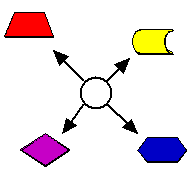
Figure 1.a
|
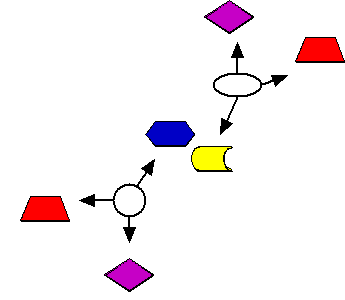
Figure 1.b
|
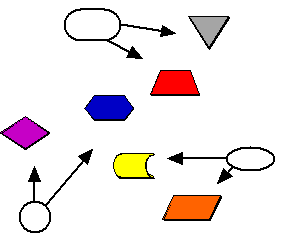
Figure 1.c
|

Figure 1.d
|
Figure 1.a illustrates man at the most basic level of social
organization, that of complete autonomy and self-sufficiency. In this
condition each individual is completely responsible for producing all
the products needed for survival.
Figure 1.b illustrates the beginnings of social production and
division of labor. In the early stages labor is only partly specialized
with some redundancy resulting in a condition where individuals are
still largely self-sufficient, but some specialization, and thus slight
dependency, takes place. The dependency is not "life critical" -
individuals are not dependent on others for survival, but a degree of
luxury is afforded by shared production.
Figure 1.c illustrates increasing socialization of production and
specialization of labor. With the further division of labor an
increasing number of products can be made, making more new things
available.
Figure 1.d illustrates one subsection of Industrialized labor. With
Industrialized labor individuals no longer produce final products, they
produce components, which are assembled into final products - a further
division of labor. This is not just the case with a true assembly line,
it is the case on a larger scale in many aspects of social labor.
Further specialization takes place making each facet of production more
efficient, increasing efficiency and ultimately the number of products
that can be produced.
| Social
Organization |
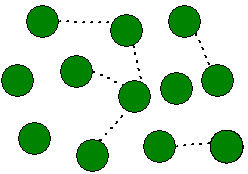
Figure 2.a
|
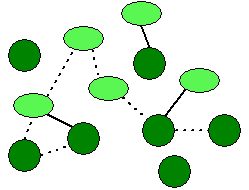
Figure 2.b
|
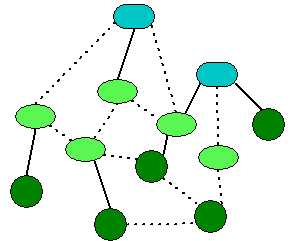
Figure 2.c
|
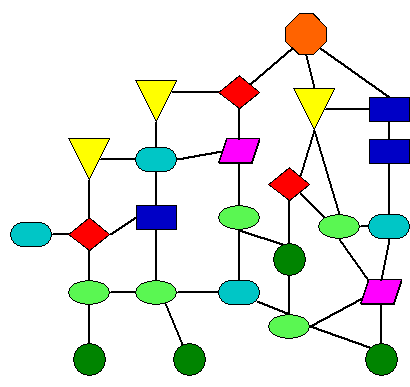
Figure 2.d
|
Figure 2.a illustrates the social organization under the mode of
production shown in Figure 1.a. To visualize it, imagine figures 1.a and
2.a together, with each individual producing everything they need for
survival. In Figure 2.a each individual is largely autonomous. Each
individual is totally independent, yet because each individual is
independent each individual has to be mostly the same and do mostly the
same things, and they all have the total burden of survival on
themselves.
Figure 2.b illustrates social organization under the mode of
production shown in figure 1.b. Here we see an increase in
interdependency. Still some autonomy, but dependencies are forming.
Figure 2.c illustrates the social organization associated with Figure
1.c, and shows the increasing interdependencies. The burden of labor is
shared so individual burden is reduced. Likewise, this facilitates
individuality as individuals differentiate and specialize, allowing
people to peruse special interests to a greater degree... in theory,
except for the fact that that some required elements of production may
not be of interest to anyone.
For example, let's say that the purple diamond in figure 1.a
represents growing corn, and the red trapezoid represents creating art.
In 2.a the individual can only devote a small amount of time to making
art because they also have to grow corn, provide shelter, and provide
clothing. In 2.c, though, certain individuals have more time to devote
to making just art, while others spend more time just growing corn.
Figure 2.d illustrates the structure of society under the Industrial
mode of production. Production is completely social when Industrial
production is adopted and every individual is dependent on other
individuals. Indeed each individual is dependent on the whole. No
individual can produce the things they need to survive and enjoy life,
all production is a group effort. This results in increased efficiency
and an increase in the amount of goods that can be produced, meaning
that a larger variety of goods are available. Likewise, each individual
is responsible for a smaller portion of the effort needed to provide for
his own survival and enjoyment, so each individual has more "freedom",
yet they are also more "dependent" at the same time.
Like Figure 2.c, the division of labor now creates a condition where
some individuals are free to peruse tasks that they enjoy, while others
have to do menial tasks, which frees the some who no longer have to do
menial work to peruse greater interests at the expense of the others.
| Scope of Awareness |

Figure 3.a
|
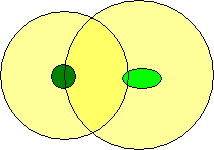
Figure 3.b
|
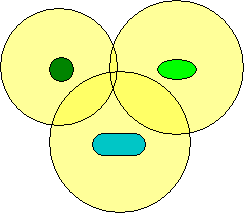
Figure 3.c
|
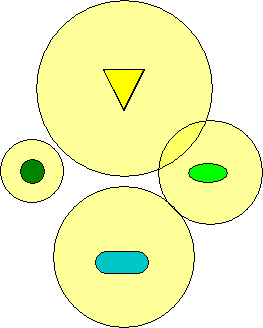
Figure 3.d
|
The figures above correspond to figure sets one and two, and
illustrate the concept of how individual awareness and social awareness
change under different modes of production and social structures. This
is a more abstract concept. As differentiation and specialization takes
place the total social awareness increases for the whole, but the
awareness of the whole by individuals generally decreases. Many
different types of people are learning about and experiencing many
different types of things as specialization increases, this is only
natural.
The United States is the most powerful country in the world
economically and militarily, and because of that many people make the
assumption that the American citizen, the basis of the American nation,
must likewise be of a superior nature, or that American society is
"superior" in general.
This, however, is not the case.
The entirety of American society has become like a giant assembly
line. Americans are increasingly narrow in their focus and understanding
of reality. People believe that this must not be true because America is
such a prosperous country, but American capitalist civilization is
superior to other civilizations in the same manner that Henry Ford's
assembly-line plants were superior to the garages of the skilled
craftsmen.
The specialization of tasks has allowed America to become
increasingly successful while the citizens become increasingly ignorant,
and in fact specialization of tasks has contributed to the
compartmentalization of American thought. People no longer have to have
a general understanding of the world in order to be successful in
America, they only have to know how to do one thing and do it well. You
can be totally wrong about almost everything in life, but as long as you
know how to do one thing good you can be a success, and in fact in a
society such as this increased specialization becomes advantageous due
to the extreme competition of our society.
The evolution of industrialized capitalist society is like the
evolution of single celled organisms into multi-celled organisms.
Specialization of tasks inevitably leads to the compartmentalization
of responsibility and the relinquishment of authority to a hierarchy of
command. This same pattern of evolution is seen in corporations and in
life. The more simplistic forms of life don't have a specialized organ
for determining action. Single-celled organisms have no brain, nor do
plants or fungi or other simple animals. More complex forms of life have
increased levels of cellular specialization and they have a brain, which
is dedicated to bodily control and regulation.
The same can be said of businesses organizations. The more complex
the business the more specialized the workers are and the more important
planning and control becomes, resulting in a chain of command with
specific planners and decision makers, ultimately a CEO and/or board of
directors. There are no democratic assembly-line plants that I know of,
and the ones that have been tried have not worked as well as those which
were not democratic, hence the continuing demise of unions.
Capitalism itself sews the seeds for the destruction of democracy.
This is because it is natural in a capitalist system for people to
become increasingly narrow in their focus and for individuals to
relinquish control in favor of efficiency.
Democracy is not an efficient system, democracy requires hard work
and extreme intellectual inefficiency. In order for a democratic system
to work well everyone has to be equally informed. This leads to
redundancy within the system, something that a capitalist system will
naturally eliminate. Capitalism naturally increases efficiency and
reduces redundancy.
So we can see that division of labor creates the ability for
"inferior" individuals to form a "superior" whole. The individuals are
not truly inferior, they are all superior at their respective tasks,
just limited in their scope.
This explains, in part, how America has been able to both excel and
fall behind at the same time.
Post Modernism, tolerance and individuality
American society has developed along the path of least resistance
generally. As our economic infrastructure has created a divided and
compartmentalized substructure, our social superstructure has followed
the same pattern. This has been embraced as the expression of
individuality. With our increased expression of individuality our
society has also called for increased tolerance. This all facilitates
subcultural compartmentalization and differentiation.
Within these social conditions Post Modernist ideology has developed.
Post Modernism is essentially the re-embracing of idealism. Post
Modernism basically states that there is no objective truth - that truth
is in the eye of the beholder. Our social tolerance and political
correctness discourage people from challenging the beliefs of others in
the Post Modernist view that "all beliefs are equally acceptable."
This is one of the reasons why the variety of religions in America
has exploded, with America now being one of the most religiously diverse
countries in the world. All religious beliefs are protected as equally
valid and beyond challenge.
This goes well beyond the issues of religion and individuality
though, it goes into people's entire concept of reality and truth.
People are able to develop their own private world-view which can be
largely detached from reality and they can still function and be
successful in society, and our society of millions of such people with
different world-views can itself also continue to thrive, or so it
seems.
American society protects the freedom to be ignorant.
This fragmented condition of society leads to increasing idealism,
that is, the lack of rationality and the lack of understanding of
concrete truths, which leads to a lack of understanding of why and how
things happen in the larger context.
Prospects for the future
What are the prospects for the future of a society such as ours?
With the increasing flexibility of modern society, via television,
the internet, gaming and growing subcultures, it is highly likely that
people will continue to diverge from each other, and from "the truth",
ideologically. Modern society, created by capitalism, provides
individuals with the means to largely define their own reality.
Television provides an increasing variety of programming in the name of
"choice", which has as its purpose "consumer satisfaction", which is
ultimately motivated by profits.
This is what "we" want; this is what "we" are
asking for, indeed demanding; More choice! More choice! More variety!
"Its all about you." (how many commercial embrace this theme?)
Individuals can now choose to expose themselves only to certain types
of information and experiences. People form prejudices and then they
seek out social reinforcements of those prejudices by customizing their
"reality." We gain the ability to truly create our own "virtual
realities."
This trend is going to continue in the future, growing increasingly
more extreme. This will, of course, be defended under the banner of
individual choice, which is something that will be market driven by
capitalism. And this is how capitalism sews the further seeds for the
destruction of democracy. This is a completely natural process and will
surely take place, it is already taking place in fact. This is the
paradox of democratic capitalism. This isn't something intentional, its
not the product of a plan or agenda, it is simply the result of the
process.
Diversity of views is not only a natural result of the division of
labor in society, but the diversity of views itself also creates a
larger market, reinforcing the phenomenon because the diversity of views
becomes catered to, and indeed encouraged, by the marketplace.
People will continue to become more specialized in their tasks,
meaning that the number of different things that people need to know
will continue to be reduced. This ever-shrinking demand for individual
scope of knowledge is what provides the opportunity for ever-growing
market share of meaningless intellectual distraction.
Religion will undoubtedly continue to benefit from this, since
religion is at its root idealistic and irrational. Religion is a
world-view based on fantasy. As people become increasingly detached from
reality, religious views can become more strongly embraced and believed.
Nationalism, religion and ignorance have always gone hand-in-hand
throughout history, and now our society has the new human invention of
corporatism to boost the influential power of ignorance. Mergers
of corporate, religious and nationalist interests can already be readily
found all over America, on television of course, but just walk into any
major outlet store which caters to the masses, such as Wal-Mart, Lowes,
or other such places, and you can see the
nationalist/religious/corporate triad in effect.
These things are not much maligned by the public because the majority
of people, out of ignorance, have bought into the American fantasy.
While religion may well play a part in all of this, secular
irrationality is just as big a problem. Both religious and non-religious
world-views become increasingly irrational and separated from reality.
Again, the economic substructure creates the "potential" for irrational
world-views, but it is society and human choice that actually
takes advantage of this potential.
In the future more personalized advertising techniques will be able
to reinforce and cater to individual world-views, further allowing and
promoting ideological compartmentalization. Media and politicians will
continue to reinforce idealism and irrational world-views based on
"faith", "destiny", "Providence", etc. The dominant elements of American
society are founded on general ignorance and are strengthened by
increasing ignorance, therefore it is unlikely that any institutional
effort to correct this "problem" will occur, as it is in fact the
institutions that promote the problem in the first place. The problem is
rooted in capitalist production itself, and as the title of this article
states, the situation is a paradox, because capitalist production is the
most productive economic system, and the protection of individualism is
inherently "good." Democracy itself will not be able to continue under
these conditions, perhaps in name, but not in practice. In fact we may
already be past that stage, and some could argue that we passed it long
ago.
But, at any rate, a population of people wholly ignorant of reality
is not fit for self government. It is doubtful that these problems will
be addressed in American society because the majority of people are part
of the problem. Irrational and ignorant views are embraced by the
majority and reinforced by the establishment, thus most prospects for a
domestic resolution to this problem are improbable. A resolution to the
problem would require the overthrow of the American establishment by a
minority, which is not likely and thus the most probable outcome is the
development of a distinct ruling class which will continue to be
supported by the ignorant majority. As individuality and luxury become
increasingly important to Americans, responsibility will continually be
voluntarily given up to leadership. People become increasingly confused
and frustrated by their own ignorance and simply give up control to
others out of convenience. This scenario is similar to that
proposed by Plato in his 360 B.C.E. work, The Republic, in which he
explains how Democracy devolves into Tyranny; yet Plato is dealing only
with the problems of democracy and tolerance themselves and not the
additional problems of the division of labor brought on by industrial
capitalism. A view of the effects of division of labor, however, was
provided by Adam Smith in his work, The Wealth of Nations.
In Book V Smith put forward a chilling, and perhaps all too accurate,
depiction of the effects of the division of labor:
In the progress of the division of labour, the employment of the
far greater part of those who live by labour, that is, of the great
body of the people, comes to be confined to a few very simple
operations, frequently to one or two. But the understandings of the
greater part of men are necessarily formed by their ordinary
employments. The man whose whole life is spent in performing a few
simple operations, of which the effects are perhaps always the same,
or very nearly the same, has no occasion to exert his understanding
or to exercise his invention in finding out expedients for removing
difficulties which never occur. He naturally loses, therefore, the
habit of such exertion, and generally becomes as stupid and ignorant
as it is possible for a human creature to become. The torpor of his
mind renders him not only incapable of relishing or bearing a part
in any rational conversation, but of conceiving any generous, noble,
or tender sentiment, and consequently of forming any just judgment
concerning many even of the ordinary duties of private life. Of the
great and extensive interests of his country he is altogether
incapable of judging, and unless very particular pains have been
taken to render him otherwise, he is equally incapable of defending
his country in war. The uniformity of his stationary life naturally
corrupts the courage of his mind, and makes him regard with
abhorrence the irregular, uncertain, and adventurous life of a
soldier. It corrupts even the activity of his body, and renders him
incapable of exerting his strength with vigour and perseverance in
any other employment than that to which he has been bred. His
dexterity at his own particular trade seems, in this manner, to be
acquired at the expence of his intellectual, social, and martial
virtues. But in every improved and civilized society this is the
state into which the labouring poor, that is, the great body of the
people, must necessarily fall, unless government takes some pains to
prevent it.
Who can know what may become of all this? Today it is not just the
poor who are impacted by division of labor. Now that capitalism has
spread the division of labor to all sectors of the economy, it affects
everyone. Instead of our government taking pains to prevent the ill
effects of division of labor upon society, these ill effects are
embraced by the dominant institutions of our society in order to
consolidate power. It's definitely not certain that our civilization
will come to ruin, in fact a new and more powerful society may be
formed, much like complex multi-cellular organisms are "superior" to
independent single cells, so too an ignorant, yet highly specialized,
American society dominated by a ruling class and living through a
multi-media fantasy may become an even more potent economic and military
power house. Then again, confusion and ignorance may become a problem,
which, along with other factors, leads to the decline of American
society. The most likely scenario is that competition from more
socialized and less ignorant societies will overtake America as the
country devolves into a state of ignorance, however, without external
pressure it is likely that a highly class structured American society
could continue on for a log time.
Whatever the case may be, the situation is a paradoxical one, and it
is one that is ultimately faced by all of humanity. By embracing
democracy, capitalism, individuality and tolerance a new society is
created in which individuality becomes meaningless and the masses become
the subjects of their own ignorance, while at the same time the society
as a whole continues to materially prosper.
"Reason and Ignorance, the opposites of each other, influence the
great bulk of mankind. If either of these can be rendered sufficiently
extensive in a country, the machinery of government goes easily on.
Reason obeys itself; and Ignorance submits to whatever is dictated to
it."
- Thomas Paine
|